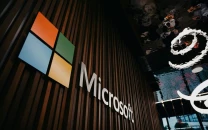US pushes Netherlands, Japan to limit chip equipment sales to China
The US first imposed restrictions in 2022 on shipments of advanced chips and chipmaking equipment to China
A US official was heading to Japan after meeting with the Dutch government to urge the allies to further restrict China's ability to produce cutting-edge semiconductors, two people familiar with the matter told Reuters.
Alan Estevez, the US export policy chief, is visiting both countries this week as part of attempts to expand a 2023 agreement between the three countries to keep chipmaking equipment from China that could help to modernise its military.
In a response on Wednesday, Chinese foreign ministry spokesperson Lin Jian said China was opposed to the US "coercing other countries and suppressing China's semiconductor industry".
"This behaviour has seriously hindered the development of the global semiconductor industry and will eventually backfire," Lin told a press briefing in Beijing.
A spokesperson for the Dutch foreign ministry confirmed a meeting had taken place in the Netherlands on Monday.
Japan's industry ministry said it has various exchanges with the United States but would not comment on diplomatic interactions.
The US first imposed restrictions in 2022 on shipments of advanced chips and chipmaking equipment to China from companies including California-based Nvidia and Lam Research.
Last July, to align with US policy, Japan, home to chip equipment makers Nikon Corp and Tokyo Electron, curbed exports of 23 types of equipment, from machines that deposit films on silicon wafers to devices that etch out the microscopic circuits.
Then the Dutch government rolled out a licensing requirement for Netherlands-based ASML's deep ultraviolet (DUV) semiconductor equipment to China, leading the company to say Chinese customers should not expect to receive its best machines after Jan. 1 2024.
ASML is the world's biggest chip equipment maker by sales and market capitalisation.
The US later imposed restrictions on additional DUV machines to a handful of Chinese factories, claiming jurisdiction because ASML's systems contain some US parts and components.
Restricted list could get longer
Washington is talking to the allies about adding more Chinese chipmaking factories to that restricted list, the sources said. There are at least five factories on it, one source said, including at least one owned by SMIC, China's largest contract chipmaker.
The US also wants to control more chipmaking equipment, one source said, asking not to be named because they were not authorised to speak publicly on the issue.
A spokesperson for the US Commerce Department declined comment.
The Dutch Foreign Ministry said Monday's meeting was part of ongoing talks on export policy and security between the US and the Netherlands.
The Netherlands "always has continual contact with our allies," the spokesperson said.
US officials also visited the Netherlands in April to try to stop ASML from servicing some equipment in China. Under US rules, US firms are barred from servicing equipment at advanced Chinese factories.
But ASML's existing servicing contracts are still in place, both sources said. One said the issue remains under discussion. The Dutch government has not agreed to the US requests but does not rule out doing so.
ASML said in April it expected to be able to service most of the billions of euros worth of equipment it has sold to China though the end of 2024, though it cannot use spare parts from the U.S. that would fall under US restrictions. ASML declined to comment on Wednesday.
A right-wing Dutch government is due to take office in early July, making it difficult to agree any significant change on export restrictions.
Sanctioned Chinese telecoms giant Huawei last year came out with a phone powered by a sophisticated chip. The Huawei Mate 60 Pro was seen as a symbol of the China's technological resurgence despite Washington's efforts.



















COMMENTS
Comments are moderated and generally will be posted if they are on-topic and not abusive.
For more information, please see our Comments FAQ